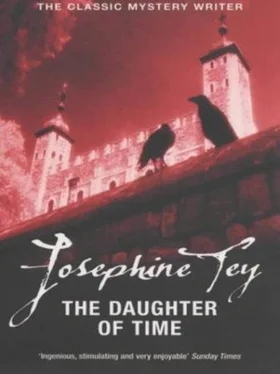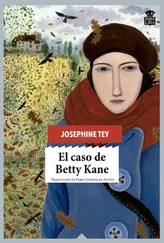Josephine Tey - The Daughter of Time
Здесь есть возможность читать онлайн «Josephine Tey - The Daughter of Time» весь текст электронной книги совершенно бесплатно (целиком полную версию без сокращений). В некоторых случаях можно слушать аудио, скачать через торрент в формате fb2 и присутствует краткое содержание. Год выпуска: 2010, Жанр: Классический детектив, на английском языке. Описание произведения, (предисловие) а так же отзывы посетителей доступны на портале библиотеки ЛибКат.
- Название:The Daughter of Time
- Автор:
- Жанр:
- Год:2010
- ISBN:нет данных
- Рейтинг книги:5 / 5. Голосов: 1
-
Избранное:Добавить в избранное
- Отзывы:
-
Ваша оценка:
- 100
- 1
- 2
- 3
- 4
- 5
The Daughter of Time: краткое содержание, описание и аннотация
Предлагаем к чтению аннотацию, описание, краткое содержание или предисловие (зависит от того, что написал сам автор книги «The Daughter of Time»). Если вы не нашли необходимую информацию о книге — напишите в комментариях, мы постараемся отыскать её.
The Daughter of Time — читать онлайн бесплатно полную книгу (весь текст) целиком
Ниже представлен текст книги, разбитый по страницам. Система сохранения места последней прочитанной страницы, позволяет с удобством читать онлайн бесплатно книгу «The Daughter of Time», без необходимости каждый раз заново искать на чём Вы остановились. Поставьте закладку, и сможете в любой момент перейти на страницу, на которой закончили чтение.
Интервал:
Закладка:
If anyone, looking in a crystal ball at that party, had told Cecily Nevill that in four years not only the York line but the whole Plantagenet dynasty would have gone for ever, she would have held it to be either madness or treason.
But what Miss Payne-Ellis had not sought to gloss over was the prevalence of the Woodville clan in a Nevill-Plantagenet gathering.
She looked round the room and wished that her daughter-in-law Elizabeth had been blessed either with a less generous heart or with fewer relations. The Woodville match had turned out far more happily than anyone had dared to hope; Elizabeth had been an admirable wife; but the by-products had not been so fortunate. It was perhaps inevitable that the governorship of the two boys should have gone to her eldest brother; and Rivers, if a little nouveau riche in his liking for display and a little too obviously ambitious, was a cultured creature and an admirable person to have the boys in charge during their schoolroom days at Ludlow. But as for the rest: four brothers, seven sisters, and two sons by her first husband, were really too many by half to have brought into the marriage market in her wake.
Cecily looked across the laughing mêlée of the children’s blind man’s buff to the grownups standing round the supper table. Anne Woodville married to the Earl of Essex’s heir. Eleanor Woodville married to the Earl of Kent’s heir. Margaret Woodville married to the Earl of Arundel’s heir. Catherine Woodville married to the Duke of Buckingham. Jacquette Woodville to Lord Strange. Mary Woodville to Lord Herbert’s heir. And John Woodville, disgracefully, to the Dowager of Norfolk who was old enough to be his grandmother. It was good that new blood should strengthen the old families new blood had always seeped in but it was not good that it should come suddenly and in a flood from one particular source. It was like a fever in the political blood of the country; a foreign introduction, difficult to be assimilated. Unwise and regrettable.
However. There were long years ahead in which that influx could be assimilated. This new sudden power in the body politic would cease to be so concentrated, would spread out, would settle down, would cease to be dangerous and upsetting. Edward for all his amiability had a shrewd common sense; he would keep the country on an even keel as he had kept it for nearly twenty years. No one had run England with a more despotic power or a lighter hand than her acute, lazy, woman-loving Edward.
It would be all right eventually.
She was about to rise and join them in their discussion of sweetmeats they must not think that she was being critical or aloof when her granddaughter Elizabeth came breathless and laughing out of the scrimmage and swept into the seat beside her.
‘I am much too old for this sort of thing,’ she said between her gasps,’and it is ruinous to one’s clothes. Do you like my dress, grandmother? I had to coax it out of Father. He said my old tawny satin would do. The one I had when Aunt Margaret came from Burgundy to visit us. That is the worst of having a father who notices what women wear. He knows too much about one’s wardrobe. Did you hear that the Dauphin has jilted me? Father is in a pet, but I am so happy. I lighted ten candles to St Catherine. It took all I had left of my allowance. I don’t want to leave England. I want never to leave England ever. Can you arrange that for me, grandmother?’
Cicely smiled and said that she would try.
‘Old Ankaret, who tells fortunes, says that I am to be a Queen. But since there is no prince to marry me I do not see how that may be.’ She paused, and added in a smaller voice: ‘She said Queen of England. But I expect she was just a little tipsy. She is very fond of hippocras.’
It was unfair, not to say inartistic, of Miss Payne-Ellis to hint at Elizabeth’s future as the wife of Henry VII if as author she was not prepared to face the unpleasantness that lay between. To presuppose in her readers a knowledge of Elizabeth’s marriage to the first Tudor king, was also to presuppose their awareness of her brothers’ murder. So that a dark reminding shadow fell across the festive scene with which she had chosen to end her story.
But on the whole, Grant thought, she had made a good enough job of the story, judging by what he had read of it. He might even go back sometime and read the bits he had skipped.
7
Grant had switched off his bedside light that night, and was half asleep, when a voice in his mind said: ‘But Thomas More was Henry the Eighth.’
This brought him wide awake. He flicked the light on again.
What the voice had meant, of course, was not that Thomas More and Henry the Eighth were one and the same person, but that, in that business of putting personalities into pigeonholes according to reigns, Thomas More belonged to the reign of Henry the Eighth.
Grant lay looking at the pool of light that his lamp threw on the ceiling, and reckoned. If Thomas More was Henry VIII’s Chancellor, then he must have lived through the whole of Henry VII’s long reign as well as Richard III’s. There was something wrong somewhere.
He reached for More’s History of Richard III . It had as preface a short life of More which he had not bothered to read. Now he turned to it to find out how More could have been both Richard III’s historian and Henry VIII’s Chancellor. How old was More when Richard succeeded?
He was five.
When that dramatic council scene had taken place at the Tower, Thomas More had been five years old. He had been only eight when Richard died at Bosworth.
Everything in that history had been hearsay.
And if there was one word that a policeman loathed more than another it was hearsay. Especially when applied to evidence.
He was so disgusted that he flung the precious book on to the floor before he remembered that it was the property of a Public Library and his only by grace and for fourteen days.
More had never known Richard III at all. He had indeed grown up under a Tudor administration. That book was the Bible of the whole historical world on the subject of Richard III – it was from that account that Holinshed had taken his material, and from that that Shakespeare had written his and except that More believed what he wrote to be true it was of no more value than what the soldier said. It was what his cousin Laura called ‘snow on their boots’. A ‘gospel-true’ event seen by someone other than the teller. That More had a critical mind and an admirable integrity did not make the story acceptable evidence. A great many otherwise admirable minds had accepted that story of the Russian troops passing through Britain. Grant had dealt too long with the human intelligence to accept as truth someone’s report of someone’s report of what that someone remembered to have seen or been told.
He was disgusted.
At the first opportunity he must get an actual contemporary account of the events of Richard’s short reign. The Public Library could have Sir Thomas More back tomorrow and be damned to their fourteen days. The fact that Sir Thomas was a martyr and a Great Mind did not cut any ice at all with him, Alan Grant. He, Alan Grant, had known Great Minds so uncritical that they would believe a story that would make a con man blush for shame. He had known a great scientist who was convinced that a piece of butter muslin was his great-aunt Sophia because an illiterate medium from the back streets of Plymouth told him so. He had known a great authority on the Human Mind and Its Evolution who had been taken for all he had by an incurable knave because he ‘judged for himself and not on police stories’. As far as he, Alan Grant, was concerned there was nothing so uncritical or so damn-silly as your Great Mind. As far as he, Alan Grant, was concerned Thomas More was washed out, cancelled, deleted; and he, Alan Grant, was beginning from scratch again tomorrow morning.
Читать дальшеИнтервал:
Закладка:
Похожие книги на «The Daughter of Time»
Представляем Вашему вниманию похожие книги на «The Daughter of Time» списком для выбора. Мы отобрали схожую по названию и смыслу литературу в надежде предоставить читателям больше вариантов отыскать новые, интересные, ещё непрочитанные произведения.
Обсуждение, отзывы о книге «The Daughter of Time» и просто собственные мнения читателей. Оставьте ваши комментарии, напишите, что Вы думаете о произведении, его смысле или главных героях. Укажите что конкретно понравилось, а что нет, и почему Вы так считаете.












